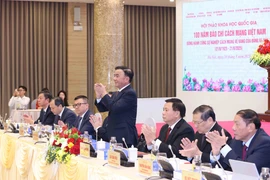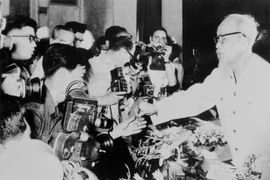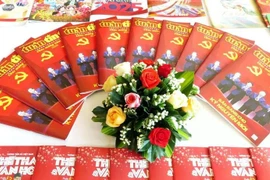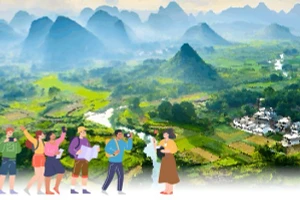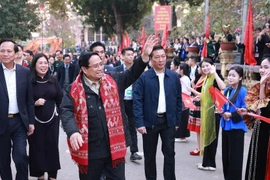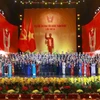Tokyo (VNA) – As Vietnam commemorates a century of revolutionary journalism, veteran Japanese journalist Toshifumi Kitagawa, long-time correspondent in Vietnam for Akahata, the official newspaper of the Japanese Communist Party, has shared his admiration for Vietnam's revolutionary press and its impressive strides in digital transformation.
Kitagawa was first introduced to Vietnamese media in late 1973, when he arrived in Hanoi to study the Vietnamese language at the University of Hanoi. Since then, his connection to Vietnam has deepened through three postings as a correspondent. He currently serves as Vice President of the Tokyo chapter of the Japan-Vietnam Friendship Association.
He recalled his early experiences with Vietnamese journalism. Just months after arriving in the country, he began reading Nhan Dan (People), Quan doi Nhan dan (People’s Army), and Ha Noi Moi (New Hanoi) - the leading dailies in Hanoi at the time. These newspapers, he said, were his primary window into the country’s political climate, especially during the final years of the struggle for national liberation in the South.
Following Vietnam’s national reunification in 1975, Kitagawa closely followed a series of articles published in Nhan dan and Quan doi Nhan dan introducing Vietnam’s ethnic groups. He archived these reports for future research. One series in particular - “The Great Spring Victory of 1975” by General Van Tien Dung - left a lasting impression. He said he was eagerly awaiting each new article.
After returning to Japan, Kitagawa’s daily routine as a foreign news editor included monitoring the Vietnam News Agency’s English-language bulletins. These reports, he noted, remained a crucial and credible source of information on Vietnam’s post-war development.
Reflecting on the historical role of Vietnamese journalism, Kitagawa highlighted the significance of wartime broadcasting. During the anti-Amerian war, a Japanese-language news programme aired by the Voice of Vietnam became popular among Japanese citizens sympathetic to Vietnam’s cause. The broadcasts, led by a female announcer, were trusted for their clarity and reliability.
The journalist also paid tribute to the sacrifices made by Vietnamese journalists in wartime, while recalling that two of his own senior colleagues died during wartime. One of them, journalist Takano, was killed in Lang Son province in the 1979 northern border defence war.
Turning to the present, Kitagawa praised Vietnam’s evolving media landscape. He noted a significant expansion in both the number of media outlets and the volume of information available. In his view, Vietnam has made remarkable progress in the digital transformation of its media sector, in some respects outpacing Japan, particularly in the growth of online news platforms.
Digital journalism in Vietnam has developed rapidly and is now my primary way of keeping up with developments in the country, Kitagawa said. He also commended the national broadcaster Vietnam Television (VTV) for its integration of digital technology, citing the convenience of watching a livestream of the recent military parade commemorating the 50th anniversary of national reunification, held in Ho Chi Minh City in late April.
Kitagawa also addressed the complex challenges facing journalism today. In the age of the internet, he said, when anyone can publish information, issues such as misinformation, fake news, and copyright infringement are growing concerns. While artificial intelligence offers valuable tools for journalists, he argued that human editorial judgement remains irreplaceable.
Across the world, including in Vietnam, journalists must retain ultimate responsibility for the information they produce, even when assisted by AI.
He concluded by emphasising the responsibility of professional journalists, including safeguarding the clarity, integrity, and standards of journalistic language./.
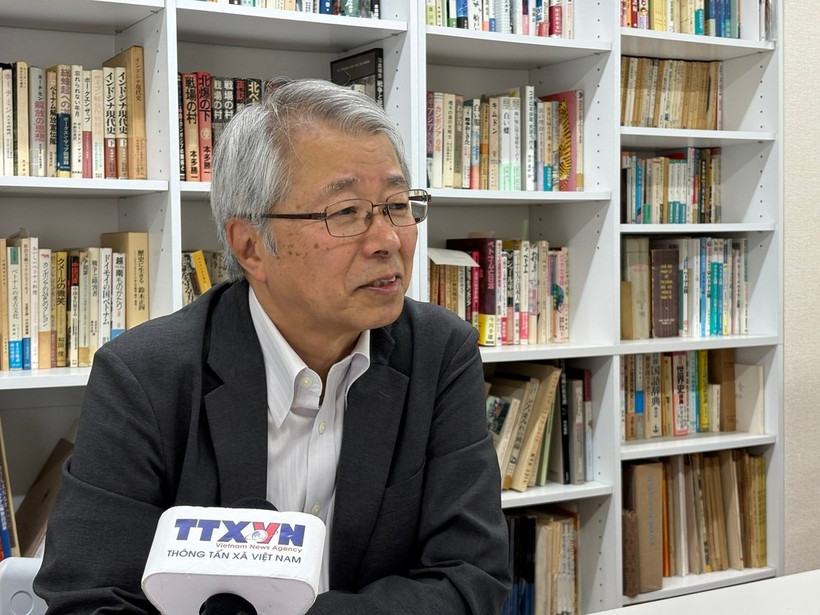
See more

Investing in educational infrastructure in mountainous areas promotes equal access to education: PM
PM Chinh noted that in recent years, education in ethnic minority, mountainous and border areas has received special attention and priority investment from the Party, the State and Party General Secretary To Lam.
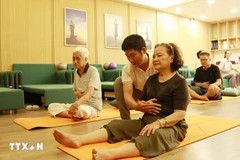
Making breakthroughs via policies for older persons
The Politburo’s Resolution No. 72-NQ/TW on groundbreaking solutions to strengthen the protection, care and improvement of public health sets the target of raising average life expectancy to 75.5 years by 2030, with at least 68 years lived in good health.
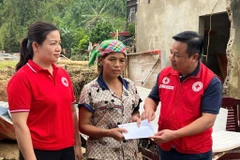
Vietnam Red Cross allocates nearly 5.2 trillion VND for humanitarian activities in 2025
Major movements, such as the Humanitarian Tet (Vietnam’s Lunar New Year Festival), the Humanitarian Month, and the campaign “each organisation, each individual linked to a humanitarian address,” continued to affirm the VRCS’s role as a connecter of social resources.
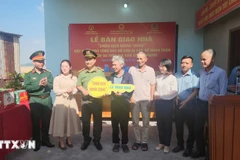
Military completes construction of 100 new homes for flood victims in Gia Lai
All houses were built to the “three-solid” technical standard, namely solid foundations, frames and roofs, ensuring durability and suitability for local living conditions.

Prime Minister urges VTV to enhance professionalism, worthy of core national media agency
PM Pham Minh Chinh affirmed that amidst complex and unpredictable global developments, Vietnam has continued to achieve comprehensive and notable socio-economic results, to which VTV has made an important contribution.
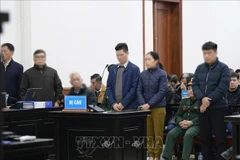
Military court imposes prison terms on defendants in Khanh Hoa land case
The case revolved around the handling of the 238-ha former Nha Trang Airport site, a prime coastal plot along Tran Phu street previously managed by the Air Force Officers’ College.

Congratulations to Vietnamese researcher in Australia
Associate Professor Nguyen Thanh Vinh of the University of New South Wales was honoured by The Australian as Australia’s most influential researcher in the field of organic chemistry.
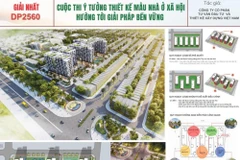
Highly applicable social housing design ideas honoured
According to the organising board, the award-winning entries will provide an important foundation for the Ministry of Construction to continue research and develop prototype and typical designs for broad use in localities.
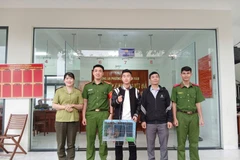
Gia Lai rangers receive rare forest night heron
The handover reflects the growing awareness and sense of responsibility among local residents in protecting wildlife, contributing to law compliance and biodiversity conservation efforts in the area.

Vietnam-funded school highlights enduring Vietnam–Cuba friendship
The Mártires de Tarará Primary School currently provides education for more than 100 pupils, ranging from kindergarten to grade six, serving Bauta district, which has a population of over 3,000.
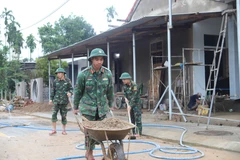
Swift campaign brings Tet homes to storm-hit residents in Hue
Quang Trung Campaign is not merely a task, but a political responsibility and a heartfelt commitment to the people. The guiding principle is to act as swiftly and decisively as possible, ensuring no family is left without shelter, especially in the days leading up to Tet, said Major General Nguyen Thanh Tuan, Director of the Hue Department of Public Security.
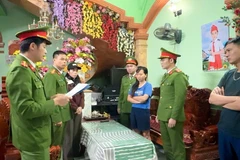
Tuyen Quang police successfully apprehend internationally wanted suspect
Police in the northern province of Tuyen Quang have successfully apprehended an internationally wanted criminal who was attempting to flee abroad, marking a significant achievement in the fight against transnational crime
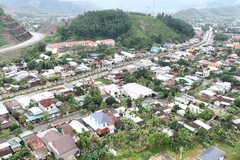
Hue city completes housing campaign five days ahead of schedule
The handover marked the final completion of the entire campaign, five days ahead of the deadline outlined in the Prime Minister’s official dispatch and in the run-up to the upcoming 14th National Party Congress.
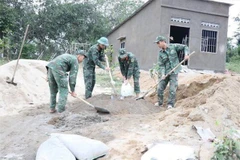
Military mobilises maximum forces to complete housing campaign on January 10
Home rebuilding must be completed on January 10, and no later than January 12, the dispatch said, saying under no circumstances, should progress be delayed.
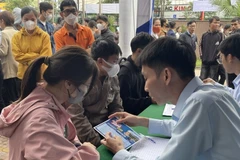
Youth joblessness remains stubborn despite labour gains
The unemployment rate of young people aged from 15 to 24 was 9.04%, higher than previous quarter and same period previous years.

Vietnam Coast Guard to ramp up IUU fishing combat during Tet
Patrol vessel KN-373, assigned to Fisheries Surveillance Flotilla No. 3 under Coast Guard Region 2 Command, will work closely with units from Vietnam Coast Guard Region 4 during the operations.
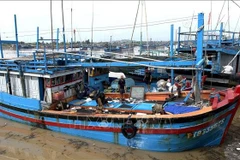
Dak Lak supports fishermen in occupational transition
As of December 5, 2025, Dak Lak had 2,556 fishing vessels, with an annual marine catch of around 68,000 tonnes. An estimated 2,900 workers are in need of occupational transition, as most have limited educational backgrounds, unstable incomes and are increasingly ageing.
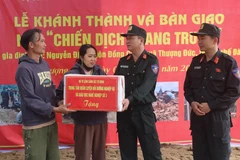
Public Security Ministry completes housing support campaign in central, Central Highlands regions
According to reports, the force built 419 new houses for families whose homes had collapsed, while repairing infrastructure in Ha Tinh, Hue, Da Nang, Quang Ngai, Gia Lai, Dak Lak, Khanh Hoa and Lam Dong.
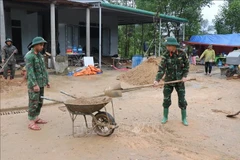
Hue races against time to build homes for families ahead of Tet
“This is not merely about building houses of bricks and cement,” a local official said, “but about restoring hope and confidence, in the spirit of leaving no one behind.”
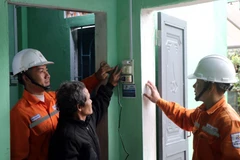
Quang Trung Campaign nears completion, helping rebuild lives in Quang Ngai
The near completion of the Quang Trung Campaign has brought reassurance and renewed optimism to storm- and flood-affected residents in Quang Ngai as the Lunar New Year approaches.
